First Amendment Attacked in the Constitution State
Under H.B.5270 and S.B.228, public employers in Connecticut would effectively be required to violate civil servants’ First Amendment rights.
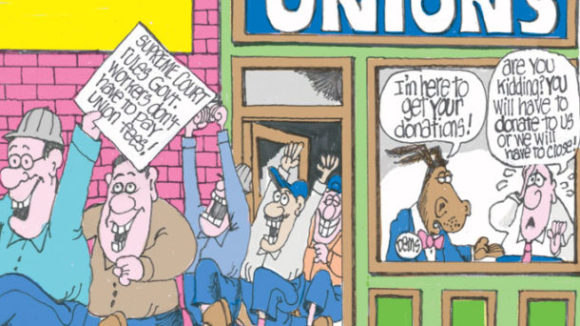
Under H.B.5270 and S.B.228, public employers in Connecticut would effectively be required to violate civil servants’ First Amendment rights.
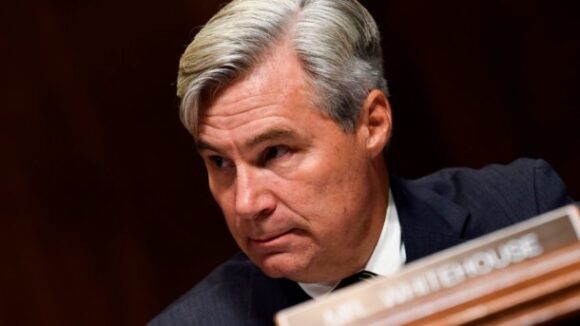
Sen. Sheldon Whitehouse (D-R.I) and other Big Labor politicians fear millions of public servants will ultimately exercise their now-recognized personal freedom to quit the union and cut off all financial support thanks to their Janus rights, won at the U.S.
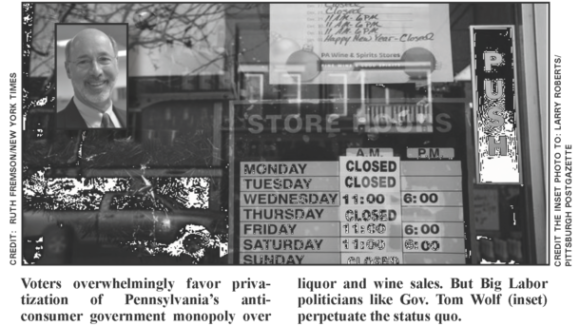
Consumers, Taxpayers Keep Getting Gouged in the Keystone State (source: National Right to Work August 2015 Newsletter) Today Pennsylvania is one of just two states in which the government retains monopolies on retail sales of both liquor and…

Union Bosses’ Monopoly Power Drives Away Taxpayers of All Kinds (Source: July 2015 National Right to Work Committee Newsletter) According to the nonpartisan, Washington, D.C.-based Tax Foundation, this year on average citizens of forced-unionism Connecticut are surrendering well…
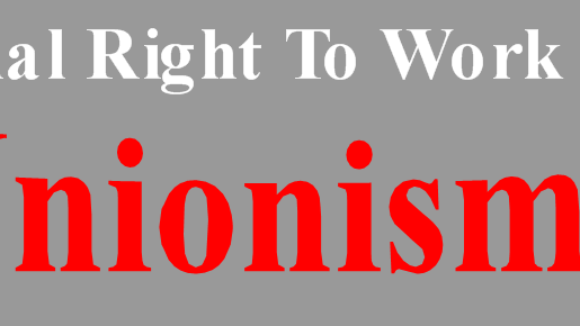
(Source: June 2010 Forced-Unionism Abuses Exposed) It doesn’t take a Sherlock Holmes or an Hercule Poirot to deduce that state policies promoting “exclusive” union bargaining and forced union dues and fees in the public sector have played a major role in driving multiple states to the verge of insolvency this year. All it takes is the willingness to look at, and respect, the facts. In 2009, according to respected labor economists Barry Hirsch and David Macpherson, 41% of public employees nationwide were subject to a contract negotiated by their employer with a union monopoly-bargaining agent. However, in 22 states, none of which authorize forced union dues for government employees and most of which don’t authorize public-sector union monopoly bargaining, either, fewer than 30% of public servants were unionized. Not one of these 22 low public-sector-unionization states was to be found on Business Insider’s list, published just last month, of the nine states “most likely to default.”
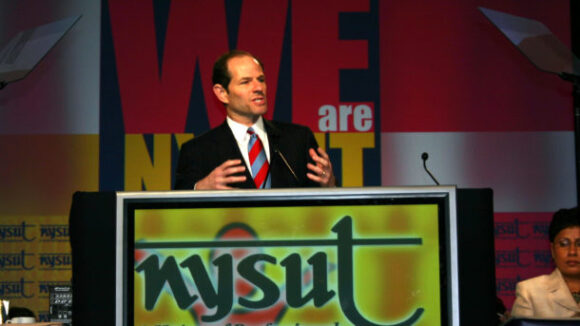
But for all his bluster, he can’t keep New Yorkers, for example, from noticing that while the number of Empire State pupils enrolled in K-12 public schools fell by more than 121,000 over the last 10 years, schools added 14,746 teachers and 8,655 non-teaching professionals to their payrolls, all of whom are required to pay union dues or fees to keep their jobs.
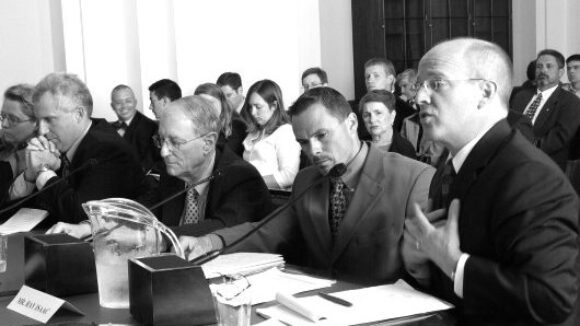
Committee President Mark Mix: The Right to Work movement and its allies are challenging President Obama’s 2009 executive order promoting union-only "project labor agreements" on federal taxpayer-funded public works. (Source: June 2010 NRTWC Newsletter) Ohio Town Council Cuts Through Big Labor/White House Fog Marietta, which has only about 15,000 residents, but enjoys a place of honor as the oldest city of any size in Ohio, is located more than 230 miles outside the Washington, D.C., Beltway. And from the vantage point of Marietta's community building at Lookout Park, where the town council considered adoption of a so-called "project labor agreement" (PLA) on May 13, it appears to be far easier to see and state the obvious than it is at the White House or on Capitol Hill. This spring, building trades union bosses lobbied furiously to convince the council's seven members to impose a Big Labor PLA on employees and firms seeking to participate in the renovation of the town's former Ohio Bureau of Employment Services building into a new municipal court facility. Parkersburg Marietta Construction and Building Trades Council union President Bill Hutchinson claimed, time and again, that the reason he and his cohorts were twisting arms to get a PLA was to ensure that "local" workers got the jobs. Finally, at the council's May 13 meeting, Councilman Jon Grimm decided to test building trades union bosses' sincerity. Mr. Grimm called attention to the provision in the PLA mandating that 50% of any contractor's employees be registered with the union and pay union dues, even if they weren't union members, and didn't want to join.

Committee President Mark Mix: The Right to Work movement and its allies are challenging President Obama’s 2009 executive order promoting union-only "project labor agreements" on federal taxpayer-funded public works. (Source: June 2010 NRTWC Newsletter) Ohio Town Council Cuts Through Big Labor/White House Fog Marietta, which has only about 15,000 residents, but enjoys a place of honor as the oldest city of any size in Ohio, is located more than 230 miles outside the Washington, D.C., Beltway. And from the vantage point of Marietta's community building at Lookout Park, where the town council considered adoption of a so-called "project labor agreement" (PLA) on May 13, it appears to be far easier to see and state the obvious than it is at the White House or on Capitol Hill. This spring, building trades union bosses lobbied furiously to convince the council's seven members to impose a Big Labor PLA on employees and firms seeking to participate in the renovation of the town's former Ohio Bureau of Employment Services building into a new municipal court facility. Parkersburg Marietta Construction and Building Trades Council union President Bill Hutchinson claimed, time and again, that the reason he and his cohorts were twisting arms to get a PLA was to ensure that "local" workers got the jobs. Finally, at the council's May 13 meeting, Councilman Jon Grimm decided to test building trades union bosses' sincerity. Mr. Grimm called attention to the provision in the PLA mandating that 50% of any contractor's employees be registered with the union and pay union dues, even if they weren't union members, and didn't want to join.
President Obama's overarching labor policy seems to be, "The more union monopoly bargaining, the better." Credit: L.A. Times (Source: June 2010 NRTWC Newsletter) Right to Work Fights For Independent Transportation Employees Over the past three-quarters of a century, federal labor policy has done enormous damage to employees and businesses by authorizing and promoting monopolistic unionism. Federally-imposed "exclusive" union bargaining undermines efficiency and productivity by forcing employers to reward equally their most productive and least productive employees. The damage is compounded when the employees already hurt by being forced to accept a union bargaining agent opposed to their interests are forced as well to pay dues or fees to the unwanted union. Fortunately, Right to Work laws in 22 states, where nearly 40% of the private-sector work force is employed, prohibit the collection of forced dues from the vast majority of employees. (Both the U.S. Supreme Court and the U.S. Congress have recognized states' freedom to protect employees' Right to Work.) However, in 1951, when Congress first foisted forced union dues and fees on employees covered by the Railway Labor Act (RLA), Big Labor senators and representatives opted to deny states the option to protect employees' Right to Work. Ever since, Big Labor has had the government-granted power to get airline and railroad employees fired for refusal to bankroll a union in all 50 states, including Right to Work states.